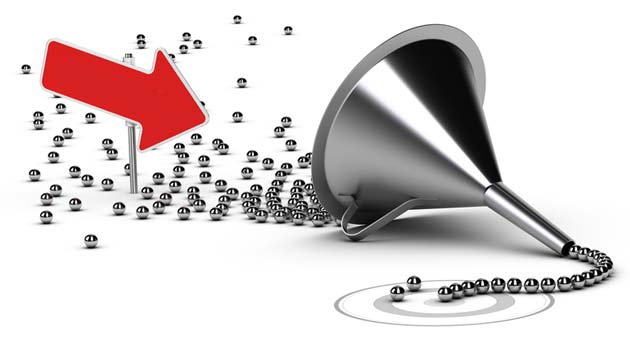How to Calculate Conversion Rate and Optimise for Sales Funnel Success

If there's one thing you will want to know when tracking activity in your sales funnel success, it's the conversion rate of leads to prospects to customers.
What is Conversion Rate
The conversion rate is the ratio of prospects to conversions. The way you define conversions will be specific to the offer you are making.
It may be an email signup, lead magnet download, purchase or anything that's important to your business.
Sales funnel success is calculated using sales funnel metrics.
If you use the Internet to generate leads then a conversion may be a completed lead form or an online sale. To measure your conversion rate, you will need to find an application that can track your conversions Google Analytics is capable of tracking a lot more than just people visiting your website; including each step of your transaction process when set up correctly.
How Google Analytics is used to track website engagement.
Once you have your tracking system in place, use the reports it generates or this simple formula to calculate conversion rate:

Total Conversions/Total Views x 100 = Conversion rate
Key metrics used to determine your sales funnel success include number and value of opportunities, close rate and length of sales cycle. There may be other indicators that you may want to measure that work specifically for your business.
Knowing the overall value of your sales funnel is very helpful for forecasting and budgets, though you also need to know the velocity with which each opportunity goes through the buying process. If you monitor your sales funnel velocity, you will be able to more accurately predict your short-term sales.
Sales Funnel Metrics Give You Business Insight
The longer a person is caught in the sales funnel, the less likely you are to convert them into a customer.
Without metrics to measure activity in your sales funnel, you'll struggle to understand when the money will come in, where it's best to make improvements and possibly overestimate your KPIs and targets.
As with many other business metrics, sales funnel success relies on active data that you take action on.
The let you:
- Predict the number of qualified opportunities as they flow through your process so that you can forecast sales and new customer acquisition
- Calculate how many leads need to be going into your funnel for you to achieve your sales targets easily
- Estimate stock levels needed based on sales funnel activity and your conversion rate on leads
- Discover how long it takes to convert a qualified lead into a customer. This will definitely help with sales projections and goals
- Clarify your understanding of where prospects are dropping out in the funnel so that you can step in and recover a relationship or transaction
- Observe how changes to the buyer funnel can improve conversion rate
- Evaluate the effectiveness of sales funnels so that you can optimise for greater success
- Know when are leads most active in a sales funnel, whether that's a time of day, day of the week or time of year
- Uncover insights into seasonal buying trends and helps you prepare the business for peaks and troughs in demand for products/services
Key Metrics that Matter for Sales Funnel Success
Beyond the obvious sales funnel tracking metrics there are some other measurements that are very valuable when it comes to judging sales funnel success.
The Average Dollar Sale
The average dollar sale refers to how much, on average, will a customer spend with you in one transaction. When you know what the amount is, you're then able to working on strategies for increasing this amount through up-sells or cross promotions. Lear more about up-selling and cross-selling HERE.
Win Rate
Win rate is the percentage of sales that you actively pursue and convert into a sale.
When you have a sales funnel that combines automated marketing activities and live engagement with your sales team, knowing your Win Rate without automation versus with your Win Rate with automation can assist with team evaluations and justifications for more systems.
[amazon_link asins='0071765735,B01M3T0PEU,1119047072,0470504544,1119209595' template='ProductCarousel' store='conversionleadership-20' marketplace='US' link_id='39afa5ed-cc03-11e7-9176-538bb6dc05ba']
Ratio of Cost of Sales to Revenue
Cost of sales to revenue ratio refers to how much it costs to make a sale divided by how much income you earn from a sale.
When measured over time gives you insight into the overall efficiency of your sales team so it can be used to gauged how long changes in head count will take to impact on revenue as well as help plan for growth.
As more businesses look to merge and tighten integration between offline and online sales and marketing activities, it's important to have a strategy for how you'll measure the success of what you do.
The metrics identified in this article are a good starting point and when measured will reveal some incredible insights into your business and sales processes.
To save yourself a lot of wasted time, learn from those who've gone before you. Investigate options and requirements for a customer lifecycle marketing system that will do as much of the measuring as possible - automatically.
We use Infusionsoft because it lets you monitor, measure and automate sales and marketing over a longer period of time. It also lets you harness volumes of data which helps you discover even more interesting things going on.
Online Sales Funnel Success Calculator
A great way to experience the value of measuring sales funnel metrics visit the MathMarketing website and trial the sales funnel calculator. This free to trial online sales funnel calculator provides interesting insights into the number of leads you need to be putting into the top of your funnel to hit your forecast revenues; one way to measure the success of your sales funnel.
Small Business Insanity Syndrome
Yes. Perhaps, like us, small business owners are insane.
Or at least our businesses can sometimes drive us insane.
If you've ever found yourself having to contend with low sales conversions and a trickle of leads and finding you're:
- Working too many evenings and weekends.
- Missing too many important life events (vacations, children's recitals, date night, etc.)
- Neglecting your favourite hobbies because "you have to work!"
- Working an 80 hour a week to avoid taking a 40 hour a week job.
See how Infusionsoft lets businesses achieve real sales funnel success.

